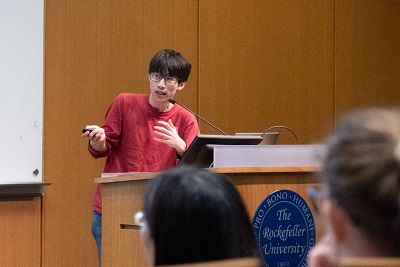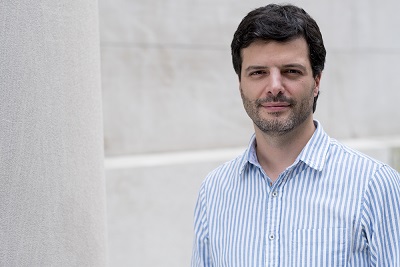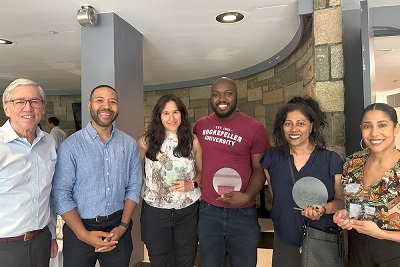Evolutionary biologist Sean B. Carroll wins Lewis Thomas Prize for Writing about Science
by Alexandra MacWade, assistant editor

Sean B. Carroll attended a reception on March 14 before receiving Rockefeller’s Lewis Thomas Prize for Writing about Science.
“How many true books about science include a coded message from occupied Hungary, written in invisible starch solution on the inside of a record album to be revealed by exposure to iodine?”
Jesse Ausubel, who chairs the selection committee for Rockefeller’s Lewis Thomas Prize for Writing about Science, recently asked this question about Sean B. Carroll’s 2013 book Brave Genius: A Scientist, A Philosopher, and Their Daring Adventures from the French Resistance to the Nobel Prize. For this and other works, Dr. Carroll, an evolutionary biologist, film producer, and author, was awarded the 2016 Lewis Thomas Prize at a ceremony in Caspary Auditorium on March 14.
Originally called the Lewis Thomas Prize for the Scientist as Poet, the award was established in 1993 by the university’s Board of Trustees to honor individuals who bridge the worlds of science and the humanities. Past winners of the prize include research physiologist Frances Ashcroft, surgeon Atul Gawande, and mathematicians Ian Stewart and Steven Strogatz.
A brave book
Dr. Carroll, who is vice president for science education at the Howard Hughes Medical Institute and professor of molecular biology and genetics at the University of Wisconsin–Madison, has played a major role in building the field of evolutionary developmental biology, known colloquially as evo-devo. His research focuses on the genes that control animal body patterns and affect the evolution of animal diversity.
His 2005 book Endless Forms Most Beautiful: The New Science of Evo Devo and the Making of the Animal Kingdom offers a framework of the then-emerging field. He has written several other books, including Remarkable Creatures: Epic Adventures in the Search for the Origins of Species, which was a 2009 National Book Award finalist.
Brave Genius tells the overlapping stories of Jacques Monod, a pioneer of molecular biology, and his eventual friend, the novelist Albert Camus. Both were involved in the French Resistance during World War II, and they each went on to win the Nobel Prize in their respective fields. And both men grappled with fundamental philosophical problems.
“It’s a brave book,” says Dr. Ausubel, who is also director of the Program for the Human Environment. “It takes on major lives and hard problems in biology, as well as sensitive and difficult philosophical and historical issues. The book is an ambitious endeavor, and Carroll succeeds.”
Inspiring others
In addition to his writing, Dr. Carroll is a skilled public speaker who has made frequent appearances in the media, often to discuss new findings in evolutionary science. He also created the Howard Hughes Medical Institute’s science filmmaking initiative and has been the host or executive producer of more than a dozen films. His achievements as a science communicator embody the original intent of the Lewis Thomas Prize—to honor those who inspire others.
Dr. Carroll earned his bachelor’s degree from Washington University in St. Louis and completed his doctorate at Tufts Medical School. He was awarded the Benjamin Franklin Medal in Life Sciences and is a member of the National Academy of Sciences. He is also a fellow of both the American Academy of Arts and Sciences and the American Association for the Advancement of Science.


